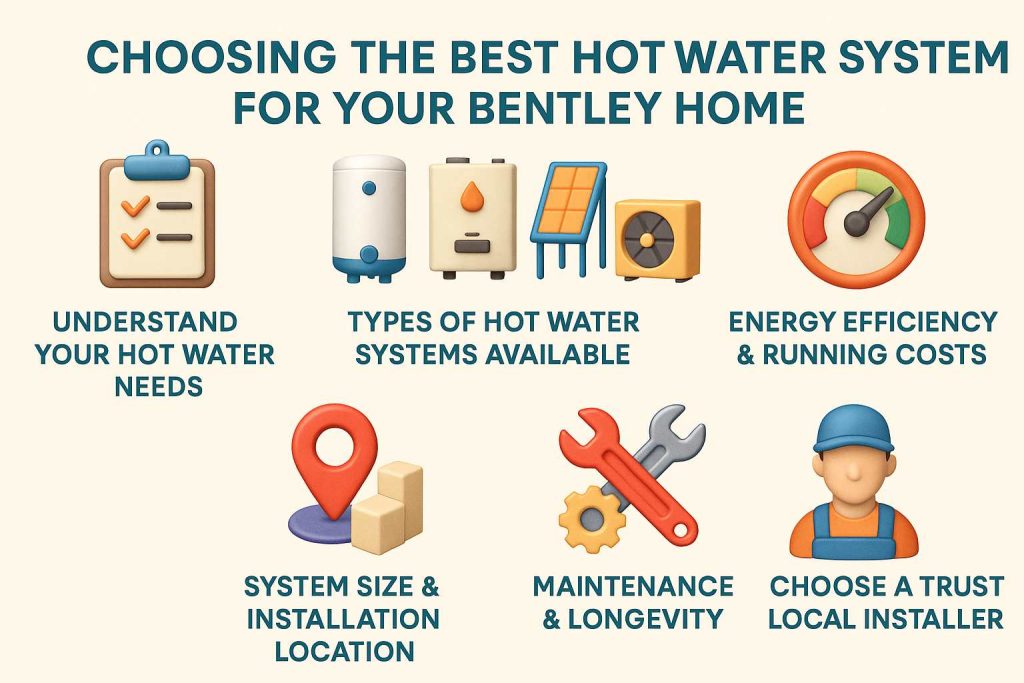Selecting the right hot water system for your Bentley home is an important investment that impacts energy efficiency, comfort, and long-term savings. With several technologies and fuel types available, choosing the right one can be overwhelming. Understanding each option’s advantages helps homeowners make informed, cost-effective decisions. A well-chosen system not only provides consistent hot water but also contributes to lower running costs and reduced environmental impact.
1. Understanding Your Hot Water Needs
Before deciding, assess your household’s daily water usage and hot water habits. Consider the number of residents, frequency of showers, and the number of appliances that use hot water, such as dishwashers or washing machines. A small household may only need a compact storage unit, while larger families or multi-bathroom homes benefit from continuous flow or gas systems. It’s also worth evaluating future needs—growing families or home renovations may require greater capacity down the track.
2. Types of Hot Water Systems Available
There are several main types of systems, each with specific advantages depending on your lifestyle and property. Electric storage systems are affordable upfront and simple to install, though they can be less energy-efficient. Gas hot water systems heat water quickly, making them ideal for families with high demand, and they continue working during power outages. Solar hot water systems use roof-mounted panels to capture sunlight, significantly reducing energy bills and emissions—perfect for Perth’s sunny conditions. Heat pump systems, on the other hand, use air-source technology to extract warmth from the air, offering a sustainable and quiet alternative that suits temperate climates like Bentley’s.
3. Energy Efficiency & Running Costs
Energy efficiency plays a key role in managing household expenses and reducing carbon emissions. When comparing systems, check the energy star rating—more stars mean greater efficiency and lower ongoing costs. Solar and heat pump units generally have higher installation costs but deliver substantial long-term savings through reduced energy consumption. Gas systems tend to be more economical than electric ones, especially when connected to natural gas. Choosing an energy-efficient option helps ensure both financial and environmental sustainability.
4. System Size & Installation Location
The right system size ensures steady water availability without unnecessary power use. A system that’s too small will struggle to meet demand, while an oversized unit wastes energy and money. Location also matters—installing your unit close to water outlets minimises heat loss and improves efficiency. Local water quality and temperature can affect system performance, so working with a qualified hot water plumber Bentley ensures your installation meets both your home’s requirements and local regulations.

5. Maintenance & Longevity
Regular maintenance is key to keeping your hot water system performing efficiently for years. This includes inspecting valves, cleaning filters, checking for leaks, and ensuring the thermostat and pressure relief valve function correctly. Neglecting maintenance can lead to corrosion, reduced water quality, or complete system failure. Engaging a licensed Bentley plumber for routine servicing ensures small issues are identified early, extending the lifespan of your system and maintaining consistent performance.
6. Choosing a Trusted Local Installer
Selecting a trusted local installer is just as important as choosing the right system. Licensed professionals provide expert guidance on which system best fits your water usage patterns and energy goals. They also ensure compliance with Australian Standards and local council regulations, protecting your home and warranty. Local installers understand Bentley’s climate, water hardness, and common installation challenges, ensuring your new system operates safely and efficiently.
Conclusion
Choosing the best hot water system for your Bentley home involves balancing efficiency, capacity, cost, and installation quality. Whether you opt for gas, solar, electric, or a heat pump, the key is selecting a system that matches your household’s needs. Partnering with a qualified local plumber ensures professional installation, ongoing maintenance, and long-term reliability. With the right guidance and equipment, you’ll enjoy efficient, consistent, and cost-effective hot water all year round.